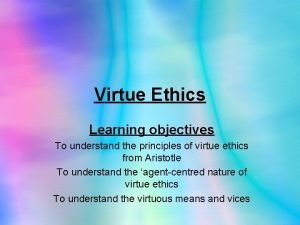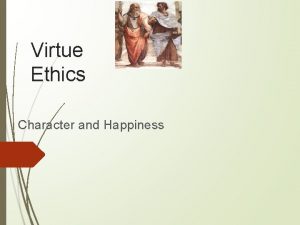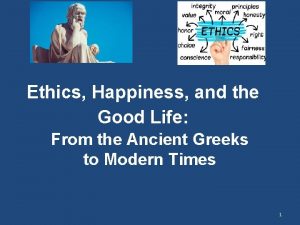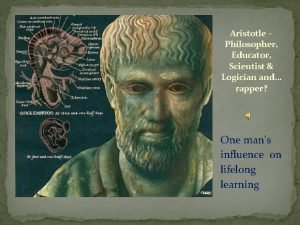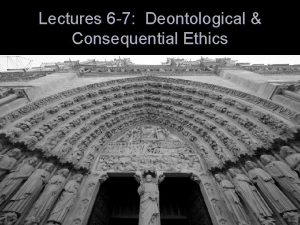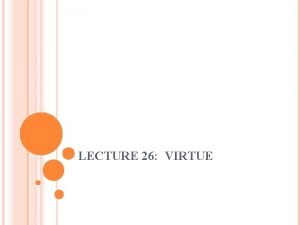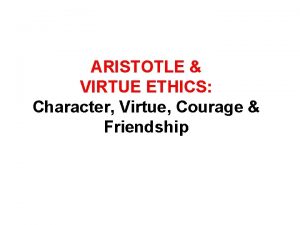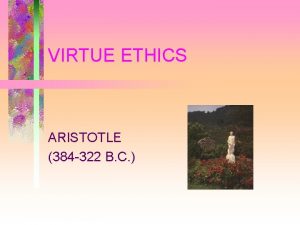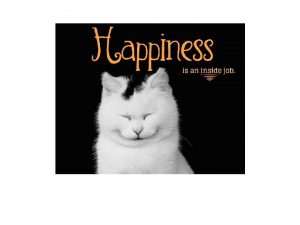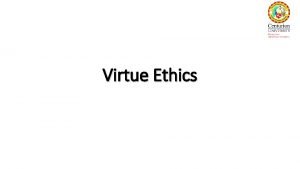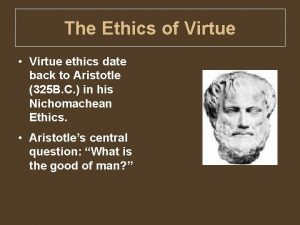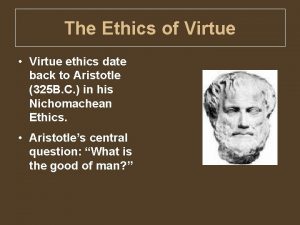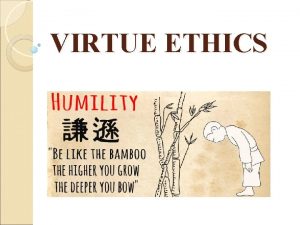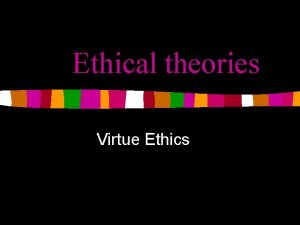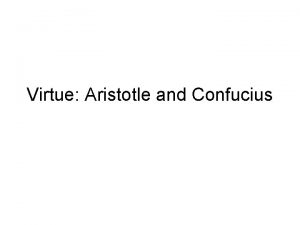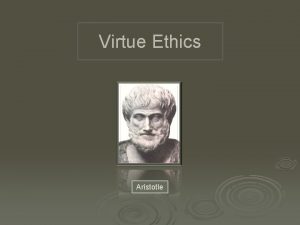Virtue Ethics Character and Happiness Aristotle Aristotle says
















- Slides: 16

Virtue Ethics Character and Happiness

Aristotle • Aristotle says that all things have a telos, or that at which they aim. • Such a telos, he says, makes things excellent. • Human telos is what we desire for its own sake. • And this is happiness. • But Aristotle noted how we can only be happy if we develop the right character.

Aristotle on Character • Aristotle insists that man has a proper function, or telos. • But, he says, this is unique to us. • Therefore, human arête or excellence is • The function of man then is activity of soul in accordance with reason, or at least not opposed to reason. • Human virtue, then, is our exercising our reason, and doing things only humans can. • And so, we must exhibit certain virtues.

Later Theories? • Typically, later normative ethical theories concentrate on action. • Indeed, this is true of all such theories. • X, Y, or Z, and their opposites, make actions right or wrong. • Actions are subsumed under these. • Unlike action based theories, virtue ethics concentrates on character. • Virtue ethics is about moral development. • So, it is about psychology.

Happiness • Aristotle insists that this highest good we value for its own sake is eudaimonia, or happiness. • Yet this more translates as well being, actually. • Still, this is vague. • As Aristotle says, we often disagree about what happiness is.

Pleasure, Fame • • Pleasure, Aristotle notes, would not make a good life. • It is superficial • And, typically fleeting Fame, moreover, is relational, in that it is given or taken by others.

Human Virtue • Aristotle insists that man has a proper function, or telos. • But, he says, this is not an animal function. • So human arête or excellence is The function of man then is activity of soul in accordance with reason, or at least not opposed to reason. • Human virtue, then, is our exercising human virtues, whatever they are. • Yet doing so in proportion. • Or at least, trying to do this. Doing so is our only path to happiness.

Training • Aristotle says only by habit do we become virtuous. • Pleasure and pain, he says, are key • The point is that moral virtue is concerned with pleasure and pains. We do bad acts because the pleasure that goes along with them, and abstain from good actions because they are painful. Therefore, there should be some direction at an early age with a view to taking pleasure in, and being pained by, the right things. • Training, thus, is teaching people to have, when do certain acts, to have the right degrees of pleasure or pain. • And so, people can form the right habits.

Which are the Virtues? • Aristotle insists that virtues are those we would want anyone to have. • Typically, these are those of a good person.

The Golden Mean • Aristotle says the right amount of these virtues is a golden mean, which is not a middle point. • But it is hard to get this mean correct. • Virtue means are individual. • And, they are situational, in that the mean for each will changes by situation. • Again, virtues must be practiced to a certain degree. • Importantly, Aristotle noes that facility with the virtues improves with practice. • Practice trains us in perceiving subtle details.

Why have Virtues? • Virtues, Aristotle says, are good for different reasons. • In particular, he says • Courage to escape danger • Generosity to help others and secure their help • Honesty, for cooperative action and social inclusion • Loyalty, to secure special commitments from others. relationships, alliances, • Still, overall, the virtuous person leads better life. • However, implies that we are similar to get better in the same ways.

First Advantage • Virtue ethics, as Michael Stocker notes, explains moral motivation. • Why do we act morally, or fail? • Smith visits hospital relative out because God, duty, etc. , tells him to. • Or, Smith visits the hospital because he is exercising benevolence, generosity, etc. • So, the idea is that in the second option, he acts from character states. • And, these states reflect who he is.

Second Advantage • Virtue ethics abandons the ideal of impartiality. • Although we hope others will act impartially, we often do not want to. • A mother donates all her excess income to the homeless, and other charities. • Yet, this mother, say, does not treat her children as special. • In such cases, impartiality seems not so good. • Virtue ethics notes how the virtues are applied differently in different cases.

Clashing Virtues • Virtue ethics recommends cultivating all the virtues. • But what about when they conflict? • Honesty vs. kindness? • Charitable giving vs. care for the family • Virtue ethics cannot tell us which one to choose, in any given case. • Instead, we would plump for one or the other.

Relativism about Virtues? • Which virtues are more important than others? • Again, which virtues are optional, and which are necessary? • How to choose? • Perhaps all virtues are relative to culture, training, etc.

What Character? • Evidence from situational psychology is that character is an afterthought, but neither truly explanatory nor predictive • Situational factors predict behavior better. Torture at Abu Ghraib
 Virtue and happiness aristotle
Virtue and happiness aristotle What were aristotle's virtues
What were aristotle's virtues Objections to aristotle's virtue ethics
Objections to aristotle's virtue ethics Criticisms of virtue ethics
Criticisms of virtue ethics Virtue ethics aristotle
Virtue ethics aristotle Aristotle ethics happiness
Aristotle ethics happiness Aristotle ethics happiness
Aristotle ethics happiness What is virtue ethics
What is virtue ethics Aristotle rapper
Aristotle rapper Real life examples of virtue ethics
Real life examples of virtue ethics Virtue ethics
Virtue ethics Utilitarian
Utilitarian Deontological ethics meaning
Deontological ethics meaning Eternal law
Eternal law Virtue vs value
Virtue vs value Utilitarianism
Utilitarianism Virtue ethics in business
Virtue ethics in business
